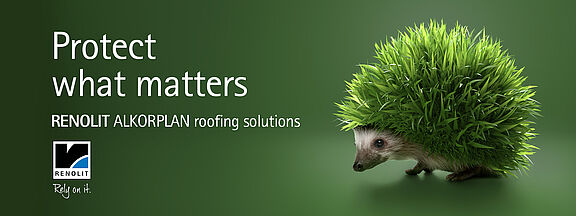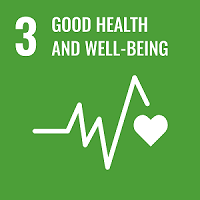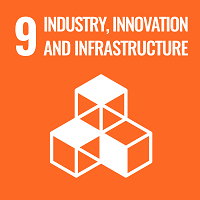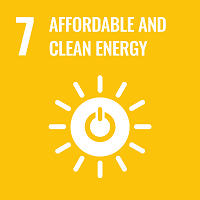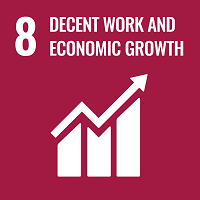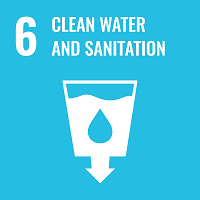PROTECT WHAT MATTERS
RENOLIT ALKORPLAN roofing products
FOR A SUSTAINABLE CONSTRUCTION INDUSTRY
Sustainability is more than a word, it is actually a duty, a way of living, of producing, of creating products that bring benefits for current and future generations. We, at RENOLIT, invite you to protect what matters, whether it concerns a building, the environment, our planet!
That is why RENOLIT ALKORPLAN is constantly investing in new technologies, unique in the sector, to create innovative and sustainable membranes. Actions are taken to improve the efficiency and effectiveness of the production system and to apply these new technologies to existing membranes as well, all in order to guarantee greater durability, less use of resources and circular economy.
In recent years, the function of a roof has experienced many changes, becoming the so-called “fifth façade”. The available space on flat roofs has been optimised and roofs more than ever have an energy and environmentally friendly function, especially in expanding urban environments. The roofing systems have an added value and contribute to well-being, ecology and economy.
“Protect what matters” is not only an invitation, it’s also - and above all - what we do. We care for people, planet and profit, a vision which is entirely in line with the Sustainable Development Goals (SDGs) - the UN's guideline for addressing economic, social and environmental sustainability challenges. For this very reason, RENOLIT set goals to achieve 12 out of 17 SDGs of the UN 2030 agenda.
Discover in what way our [RENOLIT] ALKORPLAN products contribute to the sustainable goals
[RENOLIT] ALKORPLAN Green roofs
Green roof solutions are more and more boosted by local and national governments. RENOLIT ALKORPLAN has already been convinced of the importance of green roofs for 45 years. Green roofs are aesthetically pleasant to look at, reduce noise pollution and provide additional living space. Important, as it has been proven that environmental circumstances play a decisive role in human psycho-physical wellbeing. But above all, living roofs provide a range of environmental benefits: they enhance biodiversity, improve air quality, lower carbon dioxide emissions, extend the lifespan of the roofing membrane and reduce flood risk (by absorbing heavy rainfall). A green roof even combats climate change, by lowering the temperature and thus avoiding the heat island effect in urban centres.

[RENOLIT] ALKORPLAN blue roofs
Heavy rainfall and stormy weather are increasing in frequency and intensity. That is why effective water management is essential these days. A blue roof helps by providing temporary storage of rainwater and/or slowing down the runoff speed. In this way it prevents flooding, a growing issue for many urban places due to climate overheating and increasingly frequent extreme weather events. Blue roofs were conceived for cities, so as not to waste a precious resource. The water stored on the roof can be reused for domestic application, as RENOLIT ALKORPLAN membranes do not affect the rainwater quality.
Apart from being a pleasant appearance, a blue roof reduces the temperature of the building, thus contributing to an overall improvement in the quality of life, with as a consequence a decrease in energy needs for cooling.

[RENOLIT] ALKORPLAN Bright and Cool roof
Environmental goals aim to keep global warming below 2 °C and to reduce CO₂ emissions by as much as 80-95%. Reflective cools roofs have been designed to absorb less heat and reflect more sunlight than a standard roof thanks to their white colour. This makes them definitely a solution to alleviate climate change. Being the cool roof system with the highest Solar Reflectance Index (SRI 115) value on the market, the RENOLIT ALKORPLAN Bright and Cool membranes reflect the sun's rays to the maximum. Specifically in cities, the advantage of white reflective roofs is plain to see. Cities stay cooler - which helps mitigating the 'heat island' effect -, require less air conditioning and consume less energy. In turn, the additional positive result is less carbon dioxide and an impact on the greenhouse effect. The excellent UV protective coating gives the Bright and Cool membrane an incomparable longevity.

[RENOLIT] ALKORPLAN Smart Cool roofs
RENOLIT’s mission is to produce more, using fewer resources. The innovative RENOLIT ALKORPLAN Smart membrane, with a thickness of only 1.2 mm, fits perfectly into this vision, as it offers better performances and greater durability with the use of fewer resources. Moreover, the cool colour RENOLIT ALKORPLAN Smart membrane is equipped with the Solar Shield technology, a special coating that protects the external surface of the membrane from UV rays. The coating contains special pigments which boost the reflective & emissive skills of the membrane. Protected from the degenerative effect of sunrays and less susceptible to thermal shocks, the membrane lasts much longer. An efficient and sustainable solution that contributes to sustainability certifications for buildings such as LEED, BREEAM, and VERDE.

[RENOLIT] ALKORPLAN Solar profiles
PV panels are an environmentally friendly energy solution. That’s why RENOLIT ALKORPLAN developed an ingenious system to install PV panels onto a synthetic roof by means of hot air welding, without additional ballast and without any risk of perforating the waterproofing membrane. In combination with the RENOLIT ALKORPLAN Bright roofing membrane the return of solar panels is extremely attractive because the solar reflection generates an increased return. In addition, photovoltaic modules perform better in cooler temperatures, so, as the white cool roof technology keeps the temperature around the photovoltaic panels low, this combination provides additional benefit.

PROTECT CLIMATE, ENVIRONMENT AND WATER
Climate
- Thanks to reflective cool roofs as RENOLIT ALKORPLAN Bright, Cool and Smart, cities stay cooler and require less air conditioning. The additional positive result is less CO2 emissions and a reduction of the greenhouse effect.
- For each RENOLIT ALKORPLAN product an Environmental Product Declaration has been published. An EPD is a standardized and registered document, verified by an independent expert, which is based on the Life Cycle Assessment (LCA) method. This document communicates data on the environmental impact of a given building material at each stage of the product life cycle: production, construction, end-of-life and the potential for reuse, recovery or recycling. It is a common tool to measure the actual environmental footprint of a product, thanks to KPIs such as the Global Warming Potential (GWP).
- In recent years, the optimization of logistics at RENOLIT has drastically reduced emissions, thanks to greater direct deliveries, fewer triangulations through warehouses and goods rail transport which have cut CO2 emissions down by 76%.
-As RENOLIT ALKORPLAN roofing products have in fact been paying more and more attention to what and how the products are being manufactured, a sustainability manager is in charge of favouring and accelerating this process.
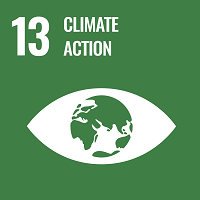
Circularity
Circularity and sustainability are ubiquitous themes in construction. Contrary to popular perception, PVC is the plastic material with the lowest dependence on oil, and the most sustainable in production as it uses little amount of energy and cheaper raw materials, largely derived from standard salt (a less expensive resource with huge reserves and the extraction of which has a very light footprint).
Nonetheless, we, at RENOLIT, dedicate ourselves day by day to reusing and recycling our materials, thus contributing to circular economy with the awareness that what was once traditionally considered to be "waste" can now become a "resource". This approach is also confirmed by the initiative RENOLIT Goes Circular, which aims to improve the efficiency of manufacturing processes, while avoiding waste and improving the recovery of waste materials.
Significant results were obtained on the recycling front:
- 8,500 tons of recycled material per year
- 100% of waste material recycled in the last eight years
- 50% of recycled material on average in every square meter of membrane
- 8% of the employed workforce in the recycling process.
At the end of life, the RENOLIT ALKORPLAN roofing membranes are fully recyclable into other new useful products. And there are more initiatives in which RENOLIT takes part. Thanks to RoofCollect, the international programme for the collection and recycling of waterproofing membranes, old PVC membranes can be fully recycled to manufacture new construction products.
Individual waste take-back pilot projects are ongoing as well: building site scraps are gathered and returned to the manufacturing plant to be fully recycled.
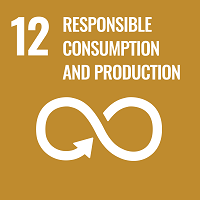
Water
Water is a precious resource, and as the world population continues to grow, the need for sustainable water management practices becomes increasingly important.
RENOLIT ALKORPLAN PVC-based roofing membranes for green or blue roofs can help achieve this goal. By capturing and storing rainwater, blue-green roofs reduce the amount of water that normally ends up in the sewer system. Harvesting rainwater on roofs really is a great, sustainable idea, given the fact that there are plenty of flat roofs available.
Unlike other roofing products that change the pH of water and/or release toxic components, the RENOLIT ALKORPLAN membranes allow to reuse rainwater for irrigation, cleaning, laundry, etc. Not only are changes to pH negligible, the chemical oxygen demand after a few rainwater cycles also remains stable, thus protecting the quality of precious water resources. This opportunity is particularly important in those geographical areas where water provision has become critical, but is also a responsible reaction everywhere, as water supplies grow ever scarcer.
In addition, RENOLIT ALKORPLAN roofing products participate in the Operation Clean Sweep programme, aimed at ensuring that no plastic particles end up in the oceans.
Durable partnerships
RENOLIT cooperate with several international associations in order to reach common objectives about the recycling of plastic materials and the sustainability of the buildings: VinylPlus, Circular Plastics Alliance, ESWA, GBCe.

Gender equality
RENOLIT ALKORPLAN roofing products is committed to equal opportunities and the professional development of employees. The company has a very active Equality Commission.

Our guarantees
Our RENOLIT ALKORPLAN products comply with the following sustainability labels:
- LEED (Leadership in Energy and Environmental Design)
- BREEAM (Building Research Establishment Environmental Assessment Method)
- VERDE (Green Building Council España)
The environmental footprint of the products are measured by EPDs (Environmental Product Declaration) according to the LCA (Life Cycle Assessment) method.
The manufacturing plant is ISO 14001 and EMAS certified and the recycling process is Eucertplast and Recovinyl certified.
Another proof of our commitment to sustainability!
RENOLIT ALKORPLAN roofing products are committed to remaining your reliable and responsible partner, dealing with energy efficiency, waste production, recycling and CO2 emissions, now and in the future.
